-
08-19-2024
Abuso sexual, aborto e saúde pública no brasil: quando o julgamento moral acentua as iniquidades
Revista Brasileira de Enfermagem. 2024;77:e77suppl0401
Abstract
Abuso sexual, aborto e saúde pública no brasil: quando o julgamento moral acentua as iniquidades
Revista Brasileira de Enfermagem. 2024;77:e77suppl0401
DOI 10.1590/0034-7167.202477suppl0401pt
Views0Eis aqui um editorial acadêmico-político que tem como objetivo convocar o campo científico a refletir sobre os perigos das decisões relativas ao direito ao aborto sob réguas morais, uma vez que não há evidências de que tal perspectiva se traduza em práticas de cuidado, proteção à infância e equidade de gênero – elementos tão urgentes […]See more -
ORIGINAL ARTICLE08-19-2024
The use of individual tracking programs in public health: a bioethics dilemma
Revista Brasileira de Enfermagem. 2024;77:e20230041
Abstract
ORIGINAL ARTICLEThe use of individual tracking programs in public health: a bioethics dilemma
Revista Brasileira de Enfermagem. 2024;77:e20230041
DOI 10.1590/0034-7167-2023-0041
Views0See moreABSTRACT
Objective:
to understand the bioethical perspectives on mobile tracking device use.
Methods:
theoretical study based on action research, carried out with eight graduate students from a public university. A focus group was used, with a thematic content analysis methodology with a codebook structure, approved by the Research Ethics Committee.
Results:
from the analysis, there was a concern about using devices after the pandemic ended. Using or not the device, rights inherent to humans, legislation and effectiveness of methods deepen interpretations, moving participants from a personalistic conception of the topic to a vision focused on professional implications about the methods.
Final considerations:
the debate on the impact of using technological devices on health, especially those that imply restriction of rights that refer to individuals’ private life, involves a discussion of a professional nature, in addition to requirement for clear rules on the topic.
-
ORIGINAL ARTICLE08-19-2024
Bioethical issues in the family health strategy: Considerations for nursing care management
Revista Brasileira de Enfermagem. 2024;77:e20220818
Abstract
ORIGINAL ARTICLEBioethical issues in the family health strategy: Considerations for nursing care management
Revista Brasileira de Enfermagem. 2024;77:e20220818
DOI 10.1590/0034-7167-2022-0818
Views0See moreABSTRACT
Objective:
To understand the bioethical issues involved in the care management of nurses working in the Family Health Strategy.
Method:
A qualitative study was conducted through five focus groups with 36 nurses selected in the sample. Thematic content analysis was performed based on the bioethical framework, and the synthesis was presented in a conceptual map.
Results:
Bioethical issues were identified in the nursing care practice, related to both specific bioethical themes and the peculiarities of the work. Additionally, challenges and facilitators that interfere with addressing these issues were identified.
Final considerations:
Understanding the bioethical issues involved in the care management of nurses was possible with the theoretical support of different bioethical perspectives. The identified issues relate to persistent and current themes in the field of bioethics. However, some aspects intrinsic to daily practice are still imperceptible to professionals, contributing to the difficulty of discussing bioethics in this care model.

-
REVIEW07-29-2024
Telenursing in the postoperative period: a scoping review
Revista Brasileira de Enfermagem. 2024;77(3):e20240066
Abstract
REVIEWTelenursing in the postoperative period: a scoping review
Revista Brasileira de Enfermagem. 2024;77(3):e20240066
DOI 10.1590/0034-7167-2024-0066
Views0See moreABSTRACT
Objectives:
to map available evidence on telenursing use in the postoperative period and its impact on patient outcomes.
Methods:
a scoping review, conducted according to the JBI model and the PRISMA-ScR checklist. The search was carried out in the CINAHL, Embase, LILACS, PubMed, Web of Science, SciELO, Scopus and Cochrane Library databases.
Results:
twelve studies were included, published between 2011 and 2023, 66.6% of which were in developed countries. Of the positive outcomes, we highlight improved levels of disability, autonomy and quality of life, lower rates of post-operative complications, pain and reduced costs. Telephone monitoring was the most widely used modality, but there were few studies in the pediatric context and in Brazil.
Conclusions:
of the studies, 11 (91.6%) identified at least one positive outcome in telenursing use and none showed negative aspects in the postoperative period. The role of nurses in digital health needs further study.

-
ORIGINAL ARTICLE07-29-2024
Men’s perception of paternal parenthood and the promotion of child development
Revista Brasileira de Enfermagem. 2024;77(3):e20230514
Abstract
ORIGINAL ARTICLEMen’s perception of paternal parenthood and the promotion of child development
Revista Brasileira de Enfermagem. 2024;77(3):e20230514
DOI 10.1590/0034-7167-2023-0514
Views0See moreABSTRACT
Objectives:
to comprehend men’s perception of paternal parenthood while caring for infants to promote child development.
Methods:
this qualitative study adopts an exploratory approach and was conducted with undergraduate and graduate students, faculty, and staff who are fathers of infants up to 6 months old from a higher education institution, excluding fathers from mononuclear families. Data collection occurred through semi-structured interviews and was analyzed using thematic categorical analysis.
Results:
fifteen men participated in the study. From the analysis, two empirical categories emerged: “Perception of being a father: challenges and novelties” and “Promotion of child development: actions carried out by fathers”. Fathers revealed feeling unprepared, the need for emotional support, and recognized activities aimed at their children’s development.
Final Considerations:
the relevance of the paternal figure for child development is highlighted, as well as the need for public policies to encourage paternal parenthood.
-
ORIGINAL ARTICLE07-29-2024
Contribution of informal caregivers to self-care in individuals with heart failure
Revista Brasileira de Enfermagem. 2024;77(3):e20230492
Abstract
ORIGINAL ARTICLEContribution of informal caregivers to self-care in individuals with heart failure
Revista Brasileira de Enfermagem. 2024;77(3):e20230492
DOI 10.1590/0034-7167-2023-0492
Views0See moreABSTRACT
Objectives:
to evaluate the contribution of informal caregivers to the self-care of individuals with heart failure.
Methods:
a cross-sectional study was conducted with 87 caregivers from March to October 2022 in the city of João Pessoa/PB. The caregivers’ contribution was assessed using the Caregiver Contribution to Self-Care of Heart Failure Index instrument. Scores ≥ 70 points indicate adequate contribution. Data were analyzed using descriptive statistics and Spearman’s correlation.
Results:
the sample consisted of 81.6% female caregivers. Median scores obtained for the self-care contribution scales were: 63.3 for maintenance; 55.5 for management; and 66.6 for confidence. Caregivers never or rarely recommended monitoring body weight, regular physical exercise, extra use of diuretics, and fluid restriction.
Conclusions:
informal caregivers showed inadequate contribution in the areas of maintenance, management, and confidence in self-care of individuals with heart failure.
-
07-29-2024
Reflections on theoretical framework use in nursing research
Revista Brasileira de Enfermagem. 2024;77(3):e20230486
Abstract
Reflections on theoretical framework use in nursing research
Revista Brasileira de Enfermagem. 2024;77(3):e20230486
DOI 10.1590/0034-7167-2024-0486
Views0See moreABSTRACT
Objectives:
to reflect on theoretical framework use in nursing research.
Methods:
a theoretical-reflexive study, based on concepts and constructs pertinent to using nursing theories and other sciences, considering issues of epistemology or philosophy of science.
Results:
we presented what it is and why to do nursing research and what a theoretical framework is and why to use it, in addition to some considerations regarding theoretical framework use in nursing research, essential for constructing disciplinary knowledge, which enables the materialization of researchers’ work and the presentation of propositions resulting from investigations in and for nursing as a discipline and science.
Final Considerations:
based on a reflection based on epistemological conceptions, it is possible to affirm that a theoretical framework is the core of researchers’ thinking, delimiting a problem to be investigated and, based on it, outlining methodological strategies to be followed, supporting nursing action and thinking as discipline and science.

-
REVIEW07-29-2024
Nursing diagnoses for people hospitalized with heart failure: an integrative review
Revista Brasileira de Enfermagem. 2024;77(3):e20230471
Abstract
REVIEWNursing diagnoses for people hospitalized with heart failure: an integrative review
Revista Brasileira de Enfermagem. 2024;77(3):e20230471
DOI 10.1590/0034-7167-2023-0471
Views0See moreABSTRACT
Objectives:
to identify in the literature the main nursing diagnoses according to the NANDA-I diagnostic classification for people hospitalized with heart failure.
Methods:
an integrative literature review, carried out in February 2019 and updated in July 2023, in the MEDLINE via PubMed, LILACS, SciELO and CINAHL databases. Given the use of acronym PEO, studies without a time cut in Portuguese, English and Spanish were included. Descriptive analysis was carried out to present the identified information.
Results:
analysis of 27 articles identified 24 nursing diagnoses, with emphasis on Decreased Cardiac Output, Excessive Fluid Volume, Decreased Activity Tolerance and Fatigue.
Final Considerations:
evidence can contribute to better diagnostic decisions centered on people with heart failure in search of more assertive health results and have the potential to support future studies on a possible syndromic pattern in this population.

-
ORIGINAL ARTICLE10-06-2023
Nursing students’ professional values for reinforcing the professional identity
Revista Brasileira de Enfermagem. 2023;76:e20220338
Abstract
ORIGINAL ARTICLENursing students’ professional values for reinforcing the professional identity
Revista Brasileira de Enfermagem. 2023;76:e20220338
DOI 10.1590/0034-7167-2022-0338
Views0See moreABSTRACT
Objectives:
to understand the nursing students’ professional values in different Brazilian universities and verify a correlation between the “Professional Value” and the sociodemographic variables.
Methods:
quantitative, cross-sectional, and descriptive study conducted through an electronic questionnaire with a Professional Values Scale (NPVS-3). Participants were Nursing students of all semesters from three universities – two in the Southeast region and one in the North region.
Results:
of the 337 participating Nursing students, 282 were female. The Caring dimension presented the highest score (mean=46.61), and Professionalism, the lowest score (mean=34.65). A statistically significant association was detected between the Caring dimension, “university where is attending,” and “gender.”
Conclusions:
the results indicate the Caring dimension as the one containing the most scored professional values since the nurses’ training, and the relation of those values in such dimension is more significant in the female sample.
-
10-06-2023
Pesquisa Translacional em Saúde: para onde vamos?
Revista Brasileira de Enfermagem. 2023;76(5):e760501
Abstract
Pesquisa Translacional em Saúde: para onde vamos?
Revista Brasileira de Enfermagem. 2023;76(5):e760501
DOI 10.1590/0034-7167.2023760501pt
Views0Os contributos das pesquisas científicas são incontestáveis para o avanço da ciência e para a sociedade. Por isso, cada vez mais reflexões acerca dos impactos e da aplicabilidade dos estudos têm permeado o centro das discussões em nível global, sobretudo diante do aumento crescente da produção de conhecimentos. Nesse cenário, a translação da pesquisa (TP) […]See more -
10-06-2023
Translational Health Research: where are we going?
Revista Brasileira de Enfermagem. 2023;76(5):e760501
Abstract
Translational Health Research: where are we going?
Revista Brasileira de Enfermagem. 2023;76(5):e760501
DOI 10.1590/0034-7167.2023760501
Views0The contributions of scientific research are undeniable for the advancement of science and for society. Therefore, more and more reflections on the impacts and applicability of studies have permeated the center of discussions at a global level, especially considering the growing increase in knowledge production. In this scenario, research translation (RT) has a notable importance […]See more -
10-06-2023
Advanced Practice Nursing: “Training” Pillar in Supporting the Proposal in Brazil
Revista Brasileira de Enfermagem. 2023;76(5):e20230118
Abstract
Advanced Practice Nursing: “Training” Pillar in Supporting the Proposal in Brazil
Revista Brasileira de Enfermagem. 2023;76(5):e20230118
DOI 10.1590/0034-7167-2023-0118
Views0See moreABSTRACT
Objectives:
to present the pillars that support what has been called Advanced Practice Nursing and discuss the necessary training for its implementation.
Methods:
elements contained in assessment documents for graduate programs proposals, reports of presentations by international professors in countries and selected scientific publications were gathered to compose the argument.
Results:
practice/competency (adds broad and in-depth knowledge about health processes and scientific evidence, clinical reasoning and clinical skills for therapeutic indications); 3) professional regulation (corresponding legislation and monitoring); and 4) funding (broad training and professional practice policy).
Final Considerations:
the agenda for implementing Advanced Practice Nursing in Brazil involves joining efforts to identify stakeholders for a work to legitimize their importance in the country’s health and education overview.

-
ORIGINAL ARTICLE10-06-2023
Quality of health care in Primary Care: perspective of people with Diabetes Mellitus
Revista Brasileira de Enfermagem. 2023;76(5):e20230008
Abstract
ORIGINAL ARTICLEQuality of health care in Primary Care: perspective of people with Diabetes Mellitus
Revista Brasileira de Enfermagem. 2023;76(5):e20230008
DOI 10.1590/0034-7167-2023-0008
Views0See moreABSTRACT
Objectives:
to identify how people with diabetes assess the care offered by Primary Care teams.
Methods:
a cross-sectional study based on structured interviews with the application of the Patient Assessment of Chronic Illness instrument to people with Type 2 Diabetes Mellitus. Data were submitted to statistical analysis.
Results:
451 individuals participated in the study, more than half aged 60 years or older (64.0%); 63.9% had been diagnosed for more than five years; and 23.9% used insulin. The average score obtained was 2.5, which indicated little involvement in self-care and low support for the care of the chronic condition by the Family Health Strategy team, and was higher among women and people with a partner.
Conclusions:
people with diabetes consider that they do not receive individualized treatment, with dialogue and discussion for setting goals, and that they are not prepared for self-managing their health condition.

-
REVIEW10-06-2023
Nursing theories in the care of stroke patients: a scoping review
Revista Brasileira de Enfermagem. 2023;76(5):e20220791
Abstract
REVIEWNursing theories in the care of stroke patients: a scoping review
Revista Brasileira de Enfermagem. 2023;76(5):e20220791
DOI 10.1590/0034-7167-2022-0791
Views0See moreABSTRACT
Objectives:
to map and synthesize nursing theories and conceptual frameworks that have been applied in the practice of nursing care for stroke patients in hospital settings.
Methods:
a scoping review was conducted in October 2022 using the MEDLINE (accessed via PubMed), CINAHL, Scielo, and Web of Science databases, following The Joanna Briggs Institute guidelines.
Results:
nine studies incorporated six nursing theories and three conceptual frameworks, which were employed to enhance stroke patient care. The objective of these theories and conceptual frameworks was to facilitate the identification of the patient’s psychobiological, psychosocial, and psychospiritual needs, elucidate the nurse’s role and expand their perspective on rehabilitation, and acknowledge the survivor’s process of transition.
Final Considerations:
this mapping exercise identified major nursing theories, middle-range theories, and conceptual frameworks applied to the care of stroke patients.

-
ORIGINAL ARTICLE10-06-2023
Learning strategies of undergraduate nursing students during the COVID-19 pandemic
Revista Brasileira de Enfermagem. 2023;76(5):e20220764
Abstract
ORIGINAL ARTICLELearning strategies of undergraduate nursing students during the COVID-19 pandemic
Revista Brasileira de Enfermagem. 2023;76(5):e20220764
DOI 10.1590/0034-7167-2022-0764
Views0See moreABSTRACT
Objectives:
to analyze the learning strategies used by nursing students from a public university, in remote teaching, during the COVID-19 pandemic.
Methods:
a cross-sectional study developed with nursing students who attended remote teaching classes. The sample was obtained by convenience and data were collected online, with 112 participants. Student and Mann-Whitney tests were performed for data analysis.
Results:
the most frequently used learning strategies were self-regulatory and cognitive. There was moderate use of interpersonal help-seeking and emotional control strategies. Male students, with a private study environment and good internet connection, used emotional control strategies more frequently.
Conclusions:
self-regulatory and cognitive learning strategies, appropriate for higher education, were frequently used by nursing students, which is an important tool for adapting these students to the university context.
-
ORIGINAL ARTICLE10-06-2023
Nursing, history, and orthopedics in manuals (1875-1928)
Revista Brasileira de Enfermagem. 2023;76(5):e20220567
Abstract
ORIGINAL ARTICLENursing, history, and orthopedics in manuals (1875-1928)
Revista Brasileira de Enfermagem. 2023;76(5):e20220567
DOI 10.1590/0034-7167-2022-0567
Views0See moreABSTRACT
Objectives:
to discuss the content of manuals, with emphasis on orthopedics, in support of the development of nursing care culture.
Methods:
cultural-historical method articulated with document analysis technique. The sources were nursing manuals – Portuguese, French, English, and Spanish – from 1875 to 1928.
Results:
this study pointed to 12 works – 6 authored by physicians, 2 by nurses, 3 institutional, and 1 by a Sister of Charity – that presented, in a transversal way, the professionalization process initiated in Europe. The manuals addressed first aid care and immobilization methods, from the simplest, such as improvised splints, to the application of plaster casts.
Conclusions:
the nurses’ work, even in a limited capacity, showed that they were able to observe warning signs so that doctors could act, with some exceptions.

-
ORIGINAL ARTICLE07-29-2024
Evidence of validity of the Risk Self-Medication Questionnaire focused on Health Literacy
Revista Brasileira de Enfermagem. 2024;77(3):e20230386
Abstract
ORIGINAL ARTICLEEvidence of validity of the Risk Self-Medication Questionnaire focused on Health Literacy
Revista Brasileira de Enfermagem. 2024;77(3):e20230386
DOI 10.1590/0034-7167-2023-0386
Views0See moreABSTRACT
Objectives:
to analyze the validity evidence of the internal structure of the Risk Self-Medication Questionnaire Focused on Health Literacy.
Methods:
a psychometric study with 499 adults. The internal structure was assessed with exploratory and confirmatory factor analysis to prove the adjustment. Internal consistency was measured by composite reliability and McDonald’s omega coefficient (ω).
Results:
the parameters revealed a model of 35 items distributed across four factors, explaining 56% of the total variance, with factor loadings ranging from 0.31 to 0.85 and adequate communalities. Accuracy (0.79
Conclusions:
an instrument was obtained with good evidence of structural validity for measuring self-medication.
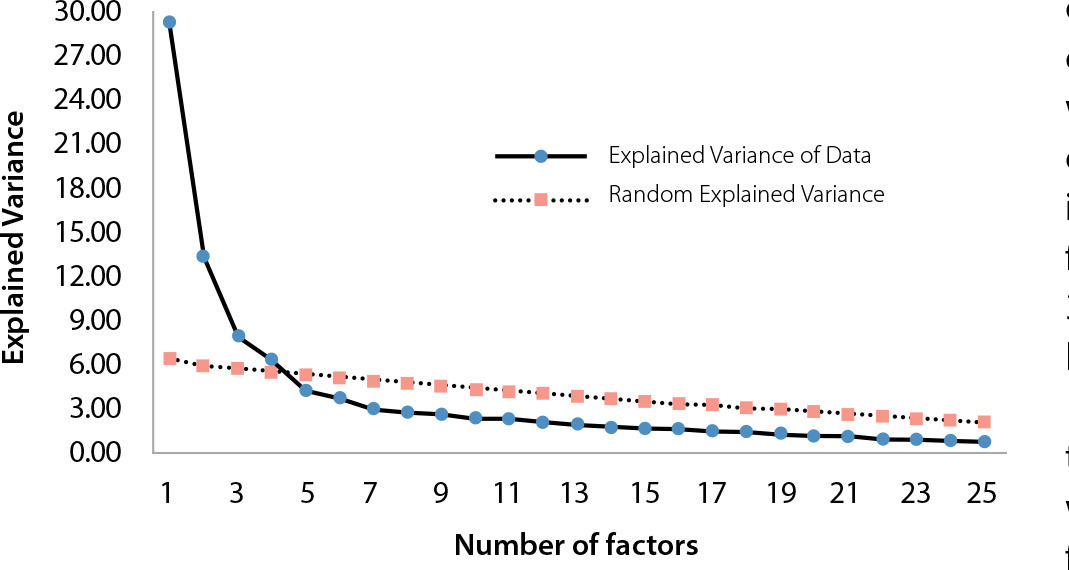
-
ORIGINAL ARTICLE07-29-2024
Nurses’ perspectives on nurses’ work methods
Revista Brasileira de Enfermagem. 2024;77(3):e20230374
Abstract
ORIGINAL ARTICLENurses’ perspectives on nurses’ work methods
Revista Brasileira de Enfermagem. 2024;77(3):e20230374
DOI 10.1590/0034-7167-2023-0374
Views0See moreABSTRACT
Objectives:
To analyze nurses’ perspectives on nurses’ work methods in the hospital context.
Methods:
A descriptive study with a qualitative approach was conducted in a hospital in northern Portugal, involving 17 nurses. Semi-structured interviews were used for data collection. Data collected between May and June 2023 underwent content analysis, supported by Atlas.ti software.
Results:
Three thematic areas emerged: “Nurses’ work methods in a hospital context,” highlighting the conception and components of work methods and the methods in use; “Implementation of nurses’ work methods,” emphasizing influencing factors and challenges to implementation; and “Impact of nurses’ work methods on patients, nurses, and institutions.”
Final Considerations:
Nurses’ work methods constitute the structure of nursing care. Some factors influence and some challenges arise in the implementation of these methods, producing impacts on patients, nurses, and institutions.

-
ORIGINAL ARTICLE07-29-2024
Nursing Process for institutionalized older adults: contributions from knowledge awareness workshop
Revista Brasileira de Enfermagem. 2024;77(3):e20230349
Abstract
ORIGINAL ARTICLENursing Process for institutionalized older adults: contributions from knowledge awareness workshop
Revista Brasileira de Enfermagem. 2024;77(3):e20230349
DOI 10.1590/0034-7167-2023-0349
Views0See moreABSTRACT
Objective:
To analyze the knowledge of professionals working in a Nursing Home about the Nursing Process before and after the awareness workshop.
Methods:
This is strategic action research, developed with nursing professionals and managers of a Nursing Home in Rio Grande do Sul, Brazil. Data were collected between January and June 2023, through semi-structured interviews before and after an awareness workshop. Discursive textual analysis of the data was carried out.
Results:
The central category “Understanding about the Nursing Process in Nursing Homes” emerged, which was unitized into two units of meaning and three categories of analysis.
Conclusion:
Data revealed non-use and lack of knowledge of the Nursing Process before awareness raising. Afterwards, a deeper understanding of the topic and its importance was identified. Awareness-raising workshops contribute to transformation of knowledge.
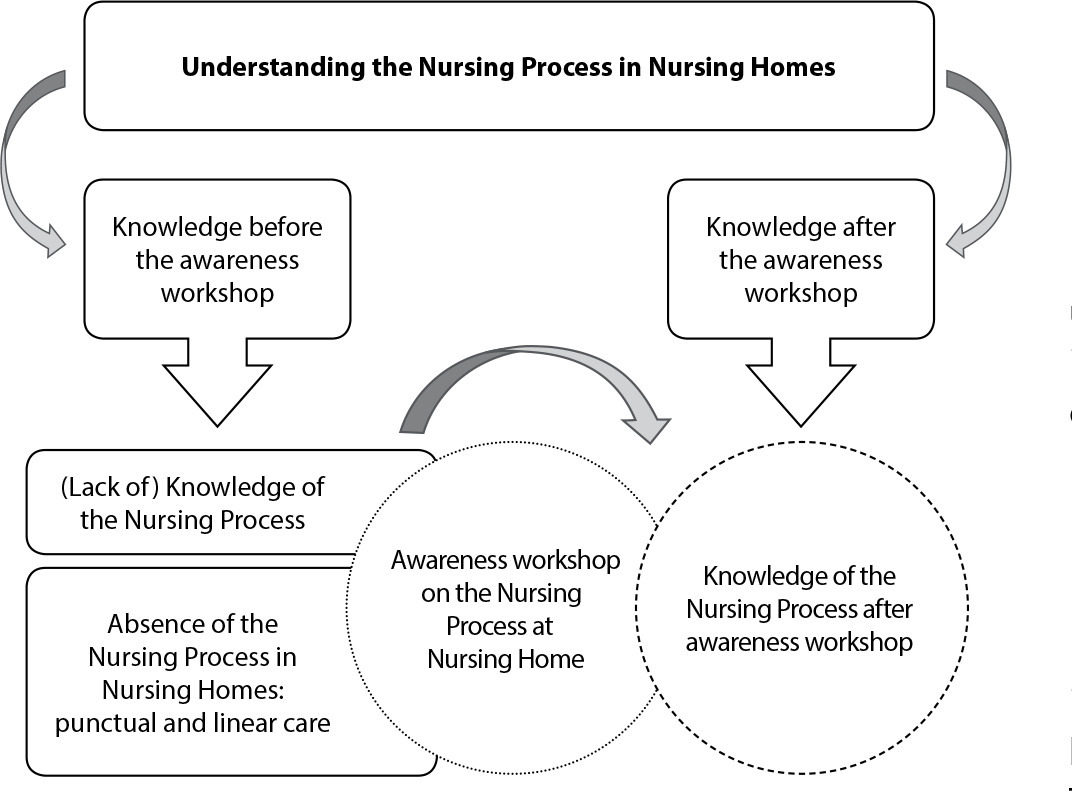
-
ORIGINAL ARTICLE07-29-2024
Excessive daytime sleepiness in nursing technicians: association with sleep quality and memory
Revista Brasileira de Enfermagem. 2024;77(3):e20230332
Abstract
ORIGINAL ARTICLEExcessive daytime sleepiness in nursing technicians: association with sleep quality and memory
Revista Brasileira de Enfermagem. 2024;77(3):e20230332
DOI 10.1590/0034-7167-2023-0332
Views0See moreABSTRACT
Objective:
to investigate excessive daytime sleepiness prevalence among nursing technicians and the association with sleep quality and memory.
Methods:
a cross-sectional, inferential study, carried out in a hospital unit in the state of Goiás between December 2020 and January 2021. Assessments were carried out using the Epworth Sleepiness Scale, the Pittsburgh Sleep Quality Index and the Prospective and Retrospective Memory Questionnaire, instruments validated for the Brazilian context. Bivariate and multivariate logistic regression analyzes were performed.
Results:
the sample consisted of 189 nursing technicians with a 40.9% excessive daytime sleepiness prevalence. In multivariate models, excessive daytime sleepiness was not associated with sleep quality, however there was a significant association with overall memory failures.
Conclusions:
study results demonstrate a high excessive daytime sleepiness occurrence, an association with overall memory failures and the need for psychosocial interventions for nursing technicians.
-
ORIGINAL ARTICLE07-29-2024
Educational technology for multidisciplinary training for managing waiting lists for elective patients
Revista Brasileira de Enfermagem. 2024;77(3):e20230299
Abstract
ORIGINAL ARTICLEEducational technology for multidisciplinary training for managing waiting lists for elective patients
Revista Brasileira de Enfermagem. 2024;77(3):e20230299
DOI 10.1590/0034-7167-2023-0299
Views1See moreABSTRACT
Objectives:
to construct and assess an educational technology for managing patient waiting lists for multidisciplinary training.
Methods:
study supported by Instructional Design – ADDIE model, whose stages of construction of educational technology were developed in the form of a multi-professional training course. Its respective content assessment was carried out by a committee of experts from 2021 to 2022. The analysis occurred based on the proportion of content adequacy with 95% Confidence Interval.
Results:
seventeen products were created as educational technology learning objects: five storyboards; four videos; three comic books; two pedagogical action plans; a mind map; and a YouTube® playlist. Nine experts assessed content adequacy, which reached 0.89.
Conclusions:
this educational technology contributes to the performance of professionals who manage waiting lists by reducing inequalities, alleviating differences, in addition to promoting equity in care and good health for patients in the Brazilian Health System.

-
ORIGINAL ARTICLE07-29-2024
Fuzzy Logic: vulnerability of women who have sex with women to sexually transmitted infections
Revista Brasileira de Enfermagem. 2024;77(3):e20230271
Abstract
ORIGINAL ARTICLEFuzzy Logic: vulnerability of women who have sex with women to sexually transmitted infections
Revista Brasileira de Enfermagem. 2024;77(3):e20230271
DOI 10.1590/0034-7167-2023-0271
Views0See moreABSTRACT
Objective:
To describe the possibility of applying Fuzzy Logic in analyzing the vulnerability of Women Who Have Sex with Women to Sexually Transmitted Infections/HIV/AIDS.
Methods:
We developed a Fuzzy Logic system with 17 input variables and one output variable, using data related to vulnerability in a municipality located in the Midwest region of the State of São Paulo, Brazil.
Results:
The factor with the greatest positive impact was the confirmation that a low understanding of Sexually Transmitted Infections/HIV/AIDS is associated with higher vulnerability. Conversely, the statement “Not disclosing sexual activity to healthcare professionals,” where individuals do not admit to having sex with women, had the least impact.
Conclusions:
Fuzzy Logic facilitates the identification of vulnerability, expressed through the analysis of interaction between variables in each dimension. This makes it a promising method to assist in analyzing the vulnerability of specific populations.
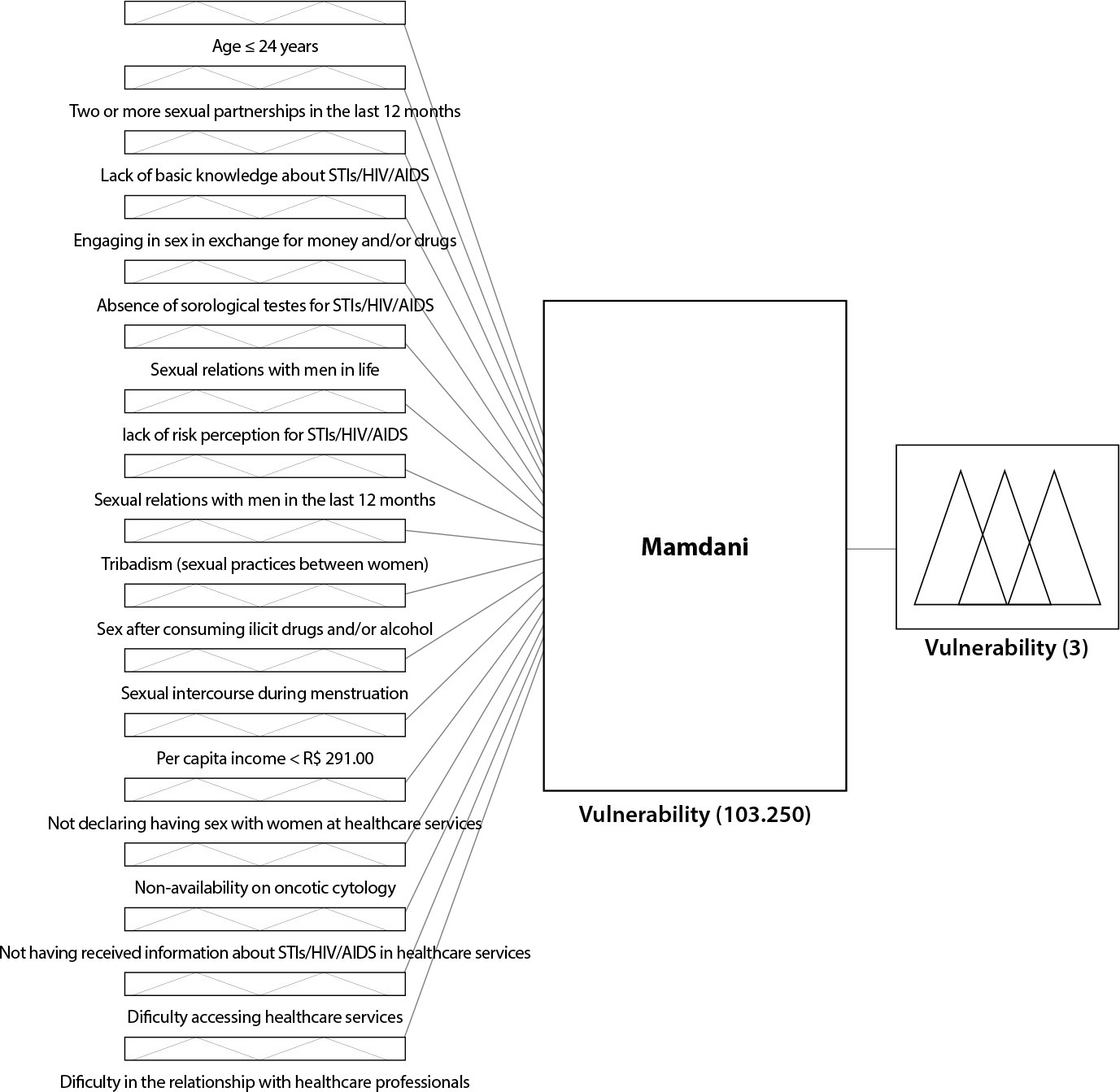
-
ORIGINAL ARTICLE07-29-2024
University Student Depression Inventory, Brazilian Version, Construct Assessment
Revista Brasileira de Enfermagem. 2024;77(3):e20230232
Abstract
ORIGINAL ARTICLEUniversity Student Depression Inventory, Brazilian Version, Construct Assessment
Revista Brasileira de Enfermagem. 2024;77(3):e20230232
DOI 10.1590/0034-7167-2023-0232
Views0See moreABSTRACT
Objectives:
to assess the University Student Depression Inventory, Brazilian version (USDI-BR), construct.
Methods:
a methodological study carried out with a snowball probabilistic sample, consisting of 334 undergraduate and graduate students. Confirmatory factor analysis, reliability using McDonald’s omega coefficient and Cronbach’s alpha were performed. Principal component analysis was performed using the varimax rotation and oblimin rotation, using the Kaiser-Meyer-Olkin criteria, Bartlett’s test of sphericity and scree plot.
Results:
the USDI-BR presented an internal consistency of items of ω = 0.95 and remained with 30 items, with the addition of 1 factor (Death wish and social withdrawal), totaling 4 factors.
Conclusions:
the USDI-BR has evidence that points to its validity and also its internal consistency, deserving that new studies be carried out to expand the evidence of its psychometric properties.
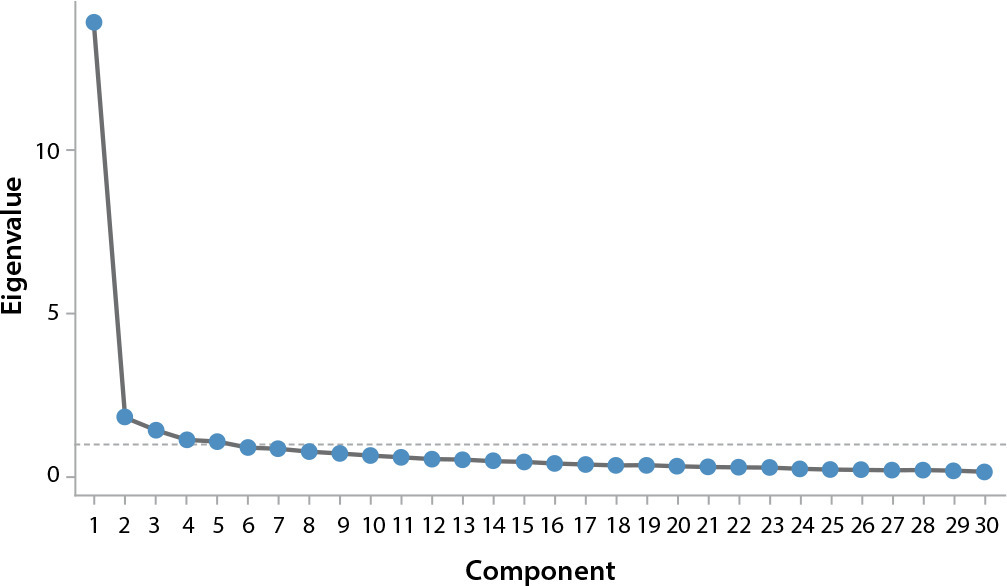
-
ORIGINAL ARTICLE07-29-2024
Family refusal of skin donation for transplantation: trends and associated factors
Revista Brasileira de Enfermagem. 2024;77(3):e20230209
Abstract
ORIGINAL ARTICLEFamily refusal of skin donation for transplantation: trends and associated factors
Revista Brasileira de Enfermagem. 2024;77(3):e20230209
DOI 10.1590/0034-7167-2023-0209
Views0See moreABSTRACT
Objectives:
to analyze the trends and factors associated with family refusal of skin donation for transplantation.
Methods:
this cross-sectional study was conducted in the State of São Paulo, with family authorization terms collected from 2001 to 2020. The variables analyzed included year, age, gender, cause of death, and type of institution. Data were analyzed using linear and multiple logistic regression, with the Odds Ratio estimated at p<0.05 for statistical significance.
Results:
1,355 individuals refused skin donation. The trend of refusals decreased between 2001 and 2009 in the age groups of 0-11 years and 12-19 years, but increased in the group aged ≥60 years. This trend continued to decrease in the 0-11 years group from 2010 to 2020, and increased in the 20-40 years group. Males and the age groups of 20-40 years, 41-59 years, and ≥60 years exhibited 27%, 34%, 47%, and 53% lower chances of refusal, respectively.
Conclusions:
there is an urgent need for measures to mitigate the high number of refusals associated with skin donation.
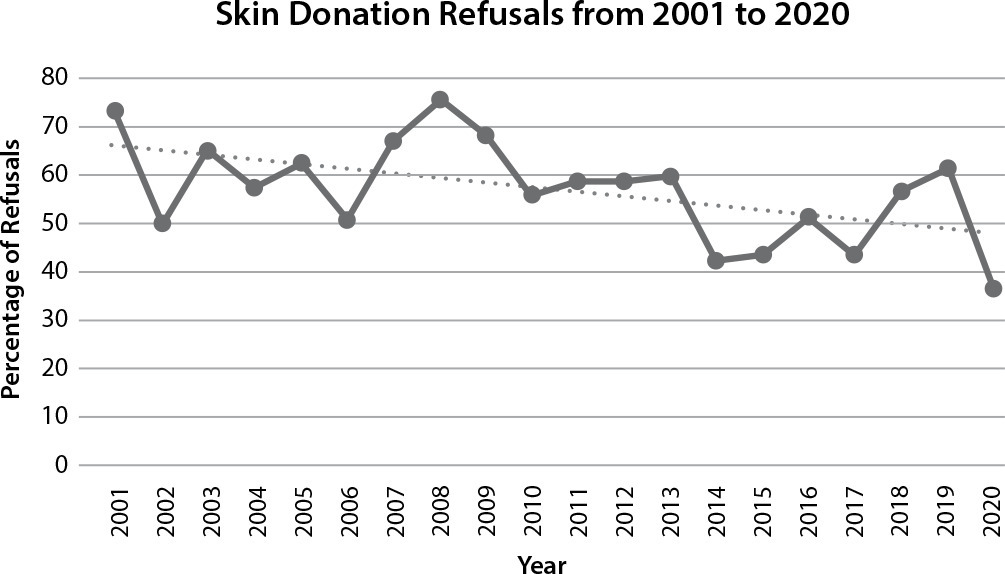
Search
Search in:
Nuvem de Tags
Adolescente (85) Atenção Primária à Saúde (239) COVID-19 (91) Criança (91) Cuidados de Enfermagem (269) Educação em Enfermagem (151) Educação em Saúde (139) Enfermagem (930) Enfermagem Pediátrica (86) Estudantes de Enfermagem (77) Estudos de Validação (131) Família (87) Idoso (208) Promoção da Saúde (99) Qualidade de Vida (104) Saúde do Trabalhador (86) Saúde Mental (145) Saúde Pública (82) Segurança do Paciente (150) Tecnologia Educacional (100)



